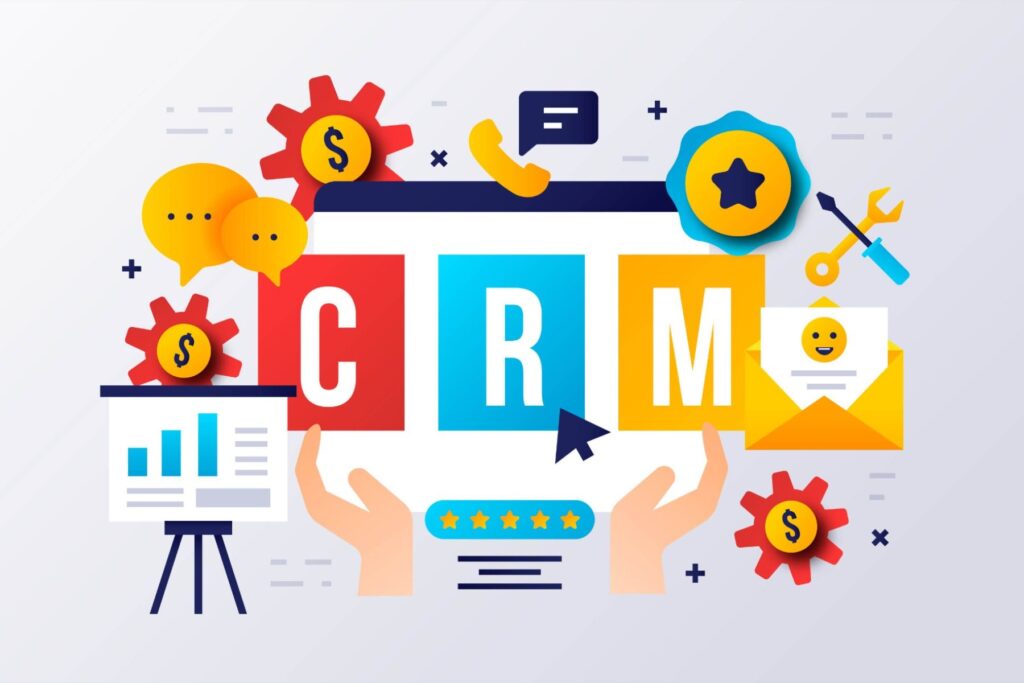Unlocking the power of crm: elevate your customer relationships and business success
CRM (customer relationship management)
Have you ever pondered how prosperous companies maintain the happiness and loyalty of their customers? The key often resides in Customer Relationship Management (CRM). CRM is an essential element of any business seeking to establish and uphold strong connections with its customers. By grasping CRM, companies can efficiently oversee customer engagements, enhance customer contentment, and stimulate expansion.

Understanding crm systems
A CRM system, or Customer Relationship Management system, plays a crucial role in modern business operations by gathering, linking, and analyzing all customer-related data. This comprehensive system captures essential information, including contact details, interactions with company representatives, purchase histories, service requests, assets, and quotes or proposals.
Through this detailed analysis, a complete customer profile is created, facilitating the development of strong customer relationships. The richness of customer data collected within the CRM can also be leveraged for various strategic initiatives, such as incentive compensation modelling, sales forecasting, territory segmentation, campaign design, and product innovation.
In essence, CRM tools and software streamline the customer engagement process, making it easier to close more sales deals and foster lasting customer relationships.
By enhancing customer loyalty and improving overall satisfaction, businesses can ultimately boost sales and increase profits. Adopting a robust CRM system not only enhances operational efficiency but also positions a company for sustainable growth in a competitive marketplace.
Brief overview of crm systems and their significance for businesses
CRM software solutions are created to assist businesses in managing their engagements with potential and existing customers. Customer information is stored, interactions are tracked, and these systems automate various processes related to sales, marketing, and customer service. The importance of CRM systems for businesses cannot be exaggerated. They empower companies to simplify operations, improve customer connections, and make data-informed decisions that result in better business results.
Types of crm systems
Operational CRM
Operational CRM focuses on automating and improving business processes related to customer interactions. Its features and functionalities include:
- Sales Force Automation: Sales tasks are automated, including lead management, sales opportunity tracking, and sales forecasting..
- Marketing Automation: Streamlines marketing campaigns, automates email marketing, and tracks campaign performance.
- Service Automation: Enhances customer service by automating ticketing systems, managing customer inquiries, and providing self-service options.
Analytical CRM
Analytical CRM is all about analyzing customer data to gain insights and improve decision-making. Its key components include:
- Data Mining: Extracts valuable information from large datasets to identify patterns and trends.
- Customer Segmentation: Groups customers based on specific criteria, such as purchasing behavior or demographics, to target them more effectively.
- Predictive Analytics: Uses historical data to forecast future customer behavior and trends.
Collaborative CRM
Collaborative CRM enhances communication and collaboration among different departments within a business. Its primary features include:
- Shared Customer Data: Ensures all departments have access to up-to-date customer information.
- Interaction Management: Tracks all customer interactions across various channels (e.g., phone, email, social media) to provide a unified view.
- Integrated Communication Tools: Facilitates communication between teams through integrated messaging, video conferencing, and collaboration platforms.
Key features of crm systems
Contact management
Contact management is a fundamental feature of CRM systems. It involves:
- Storing Customer Information: Keeps detailed records of customer contact information, interactions, and preferences.
- Organizing Contacts: Allows businesses to categorize and manage contacts efficiently.
- Tracking Interactions: Monitors all customer interactions to provide a comprehensive view of customer relationships.
Sales management
Sales management features help businesses streamline their sales processes. Key functionalities include:
- Lead Management: Captures and tracks leads throughout the sales funnel.
- Opportunity Management: Manages sales opportunities and tracks their progress.
- Sales Forecasting: Predicts future sales based on historical data and current trends.
Customer service
Customer service features enhance the ability to provide exceptional customer support. These include:
- Ticketing System: Manages customer inquiries and issues through a centralized ticketing system.
- Knowledge Base: Provides customers with self-service options through a comprehensive knowledge base.
- Customer Support Automation: Automates routine support tasks to improve efficiency.
Marketing automation
Marketing automation features streamline marketing efforts and improve campaign effectiveness. These include:
- Email Marketing: Automates email campaigns and tracks their performance.
- Campaign Management: Manages marketing campaigns from planning to execution and analysis.
- Lead Nurturing: Engages and nurtures leads through targeted marketing efforts.
CRM: Its purpose and goals
Customer Relationship Management (CRM) software is designed to foster strong, productive, and loyal relationships with customers by delivering informed and superior experiences. The primary goal of CRM is to enhance customer acquisition and retention by creating experiences that encourage customers to return. CRM functions as both a strategic approach and a valuable tool that supports these objectives in several crucial ways.
Enhancing customer communication
One of the fundamental aspects of CRM is its ability to address essential customer inquiries effectively. It aids in identifying new prospects, facilitating sales, and nurturing lasting relationships with customers.
By collecting various types of customer data and organizing it effectively, CRM systems enable businesses to understand their customers better and anticipate their needs.
Effective customer data management
Access to accurate customer data is critical for informed decision-making. CRM systems provide a structured environment for storing, tracking, and validating customer information, empowering sales and marketing teams to optimize their engagement strategies.
By leveraging this data, businesses can build stronger relationships with customers, minimizing the risk of poor decisions that stem from a lack of relevant insights.
Streamlining the sales process
Sales automation through CRM systems significantly enhances selling efficiency, allowing teams to close deals more swiftly. Advanced CRM platforms utilize artificial intelligence (AI) and unified customer data to streamline the sales process.
They provide sales teams with insights and recommendations for next-best actions, which not only accelerates the sales cycle but also enhances the likelihood of successful conversions.
Personalizing marketing efforts
In today’s multi-channel environment, customers engage with businesses through various platforms, including websites, social media, and email. Many organizations face challenges in coordinating marketing efforts across these channels.
CRM systems empower marketing teams to improve conversion rates by delivering personalized and consistent messaging. By utilizing CRM tools, businesses can strengthen customer relationships and enhance their overall marketing effectiveness.
Fostering sales and marketing alignment
CRM plays a vital role in aligning sales and marketing teams, creating a cohesive strategy that drives revenue growth. When both departments collaborate effectively, they can share valuable insights and strategies that enhance productivity.
This alignment not only boosts sales efficiency but also increases the return on investment (ROI) for marketing initiatives, leading to more successful outcomes for the organization.
Benefits of using a crm system
Improved customer relationships
CRM systems help businesses build and maintain strong customer relationships by providing a 360-degree view of each customer. This enables personalized interactions and better understanding of customer needs.
Enhanced customer retention
By tracking customer interactions and preferences, CRM systems enable businesses to provide timely and relevant support, leading to higher customer satisfaction and retention rates.
Increased sales and revenue
CRM systems streamline sales processes, improve lead management, and enhance sales forecasting, ultimately leading to increased sales and revenue.
Streamlined operations
CRM systems automate various business processes, reducing manual tasks and improving efficiency. This allows employees to focus on more strategic activities.
How to choose the right crm system
Factors to consider: business size, industry, budget
When choosing a CRM system, consider the following factors:
- Business Size: Select a CRM system that scales with your business size and growth.
- Industry: Choose a CRM system tailored to your industry’s specific needs and requirements.
- Budget: Consider the total cost of ownership, including licensing, implementation, and ongoing maintenance costs.
Comparison of popular crm systems
When evaluating popular CRM systems, it’s essential to compare them based on several key factors, including features, pricing, user reviews, and scalability. Each CRM offers unique advantages that can cater to the specific needs of different businesses.
Salesforce
Salesforce is one of the most recognized CRM platforms, known for its extensive features that include advanced analytics, customizable dashboards, and a wide array of integration options. However, its pricing can be on the higher end, making it more suitable for larger enterprises with robust budgets. User reviews often highlight its powerful capabilities but also mention a steep learning curve for new users.
HubSpot
HubSpot CRM, on the other hand, is renowned for its user-friendly interface and robust free tier, which provides small to medium-sized businesses with essential CRM functionalities without initial costs. As businesses grow, they can opt for paid features, which include advanced marketing tools and automation capabilities. User reviews frequently praise HubSpot for its ease of use and excellent customer support.
Zoho CRM
Zoho CRM is another strong contender, offering a wide range of features at competitive pricing. Its scalability makes it an appealing choice for startups and growing businesses looking for flexibility. Users appreciate its customizable options and integration capabilities, which can adapt to different business needs. However, some reviews note that its interface could benefit from improvements in usability.
Microsoft dynamics 365
Microsoft Dynamics 365 combines CRM and ERP (Enterprise Resource Planning) functionalities, making it a powerful option for organizations looking for a comprehensive solution. Its seamless integration with other Microsoft products can be a significant advantage for companies already using tools like Outlook and Teams. Users often highlight the platform’s scalability and advanced analytics features, but they also mention that it may require a more significant investment in terms of both time and money.
Implementation of a crm system
Steps to successfully implement a crm system
Implementing a CRM system involves several steps:
- Define objectives: clearly outline the goals and objectives of implementing the crm system.
- Choose the right crm: select a crm system that meets your business needs.
- Plan the implementation: develop a detailed implementation plan, including timelines, resources, and milestones.
- Data migration: transfer existing customer data to the new crm system.
- Customization: configure the crm system to match your business processes and workflows.
- training: provide comprehensive training to employees to ensure they can effectively use The crm system.
- Go live: launch the crm system and monitor its performance.
Training and support considerations
Successful CRM implementation requires ongoing training and support. Ensure that employees are trained on how to use the CRM system effectively and have access to support resources for troubleshooting issues.

Challenges in crm implementation
Common challenges and how to overcome them
Implementing a CRM system can present several challenges, such as:
- Resistance to change: employees may resist adopting new technology. overcome this by involving them in the implementation process and highlighting the benefits of the crm system.
- Data migration issues: migrating data from legacy systems can be complex. ensure thorough data cleaning and validation before migration.
- Customization complexity: customizing the crm system to fit specific business needs can be challenging. work with experienced crm consultants to ensure proper configuration.
Importance of data quality and user adoption
High-quality data is essential for CRM success. Ensure that data entered into the CRM system is accurate, complete, and up-to-date. Additionally, user adoption is critical; employees must actively use the CRM system for it to deliver value. Provide ongoing training and support to encourage user adoption.

Future trends in crm
Emerging technologies and their impact on crm
Emerging technologies are shaping the future of CRM systems. These include:
Artificial intelligence (ai)
AI-powered CRM systems can automate routine tasks, provide predictive insights, and enhance customer interactions through chatbots and virtual assistants.
Machine learning
Machine learning algorithms can analyze customer data to identify patterns and predict future behavior, helping businesses make more informed decisions.
Internet of things (Iot)
Iot integration with crm systems can provide real-time data from connected devices, enabling proactive customer support and personalized experiences.
The role of ai and machine learning in crm
AI and machine learning are transforming CRM systems by:
- Automating Tasks: AI can automate repetitive tasks, freeing up employees to focus on more strategic activities.
- Enhancing Customer Insights: Machine learning can analyze vast amounts of data to provide deep customer insights and predictive analytics.
- Improving Customer Experience: AI-powered chatbots and virtual assistants can provide instant support and personalized recommendations, improving the overall customer experience.
How much does a crm cost?
When considering the potential of customer relationship management (CRM) software, many business leaders quickly realize the significant impact it can have on their operations, customer interactions, and overall growth.
However, the common misconception is that implementing a CRM solution comes with a hefty price tag. In reality, the cost of CRM software varies widely, making it accessible for businesses of all sizes, from small startups to large enterprises.
CRM solutions are designed to cater to the diverse needs of organizations, enabling them to manage customer relationships effectively and streamline processes. These systems offer various pricing models, allowing companies to choose options that best fit their budget and specific requirements.
For small businesses, affordable CRM options often start with essential features, such as contact management, lead tracking, and basic reporting capabilities. Many CRM providers offer tiered pricing plans, allowing you to start with a lower-cost package and upgrade as your business grows and your needs evolve.
On the other hand, large enterprises may require more robust CRM solutions with advanced functionalities, such as in-depth analytics, customizable workflows, and integration with other enterprise software.
FAQs
What is crm?
crm, or customer relationship management, refers to strategies and technologies that companies use to manage and analyze customer interactions and data throughout the customer lifecycle. its goal is to improve customer service relationships, assist in customer retention, and drive sales growth.
Why is understanding crm important for businesses?
understanding crm is crucial because it helps businesses manage customer interactions efficiently, enhance customer satisfaction, and foster long-term loyalty. effective crm implementation can lead to improved business performance and customer retention.
What are the different types of crm systems?
there are three main types of crm systems:
- operational crm: focuses on automating and improving customer-facing processes.
- analytical crm: analyzes customer data for better decision-making.
- collaborative crm: enhances communication and collaboration within the business and with customers.
What are some key features of crm systems?
key features of crm systems include contact management, sales management, customer service, and marketing automation. these features help businesses store customer information, manage sales processes, track customer interactions, and automate marketing efforts.
How can a business choose the right crm system?
choosing the right crm system involves considering factors such as the size of the business, industry-specific needs, and budget. comparing features, pricing, user reviews, and scalability of popular crm systems like salesforce, hubspot, zoho crm, and microsoft dynamics 365 can help in making an informed decision.


